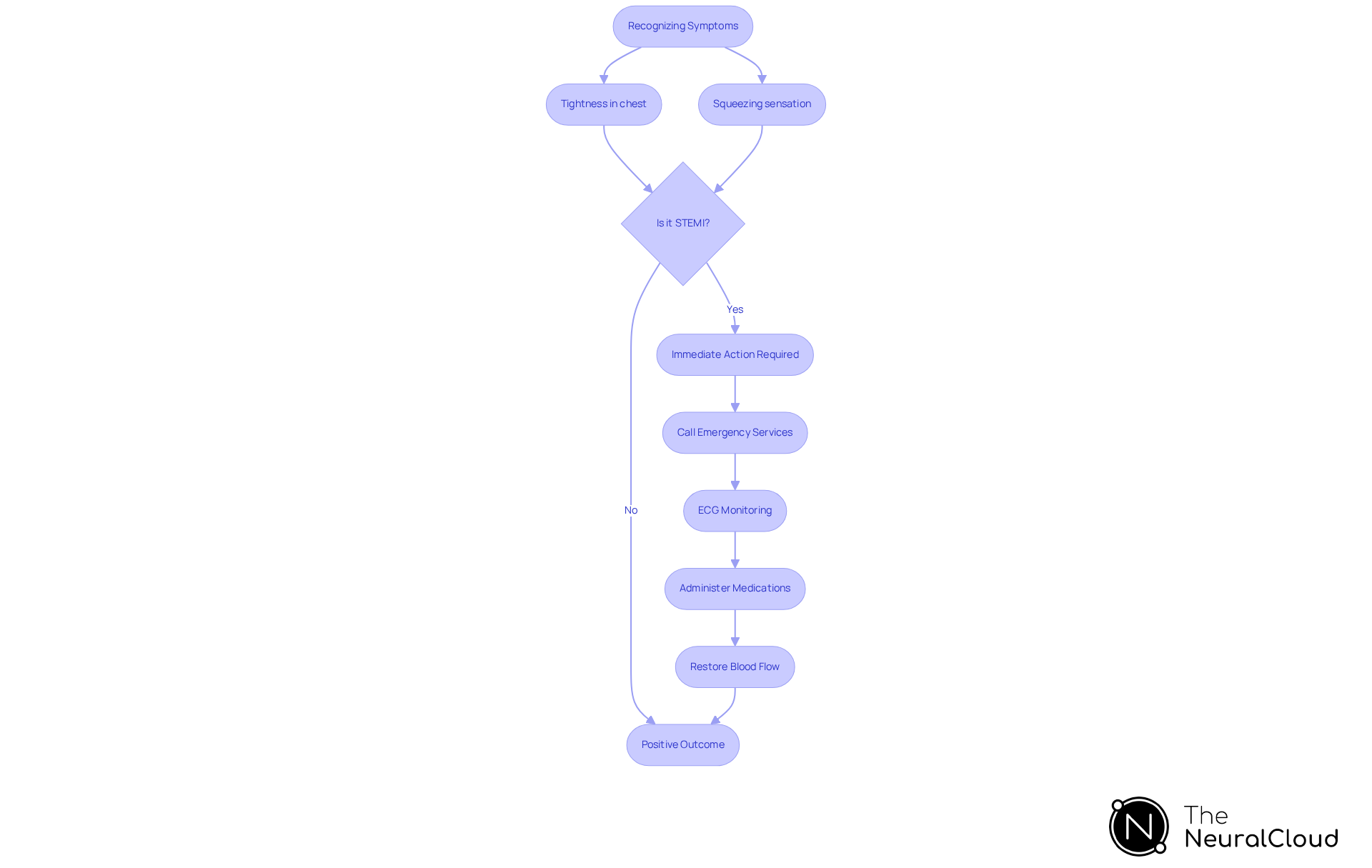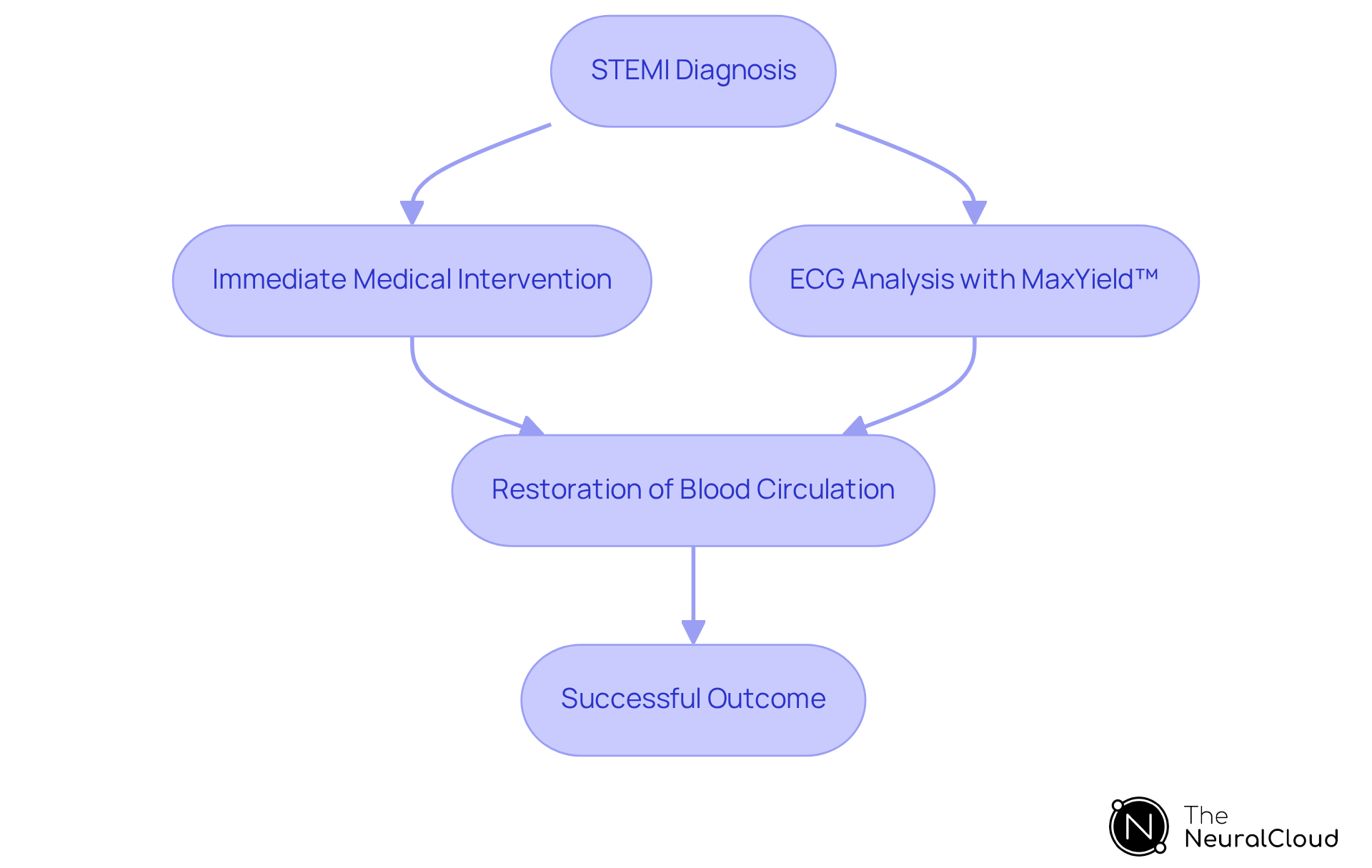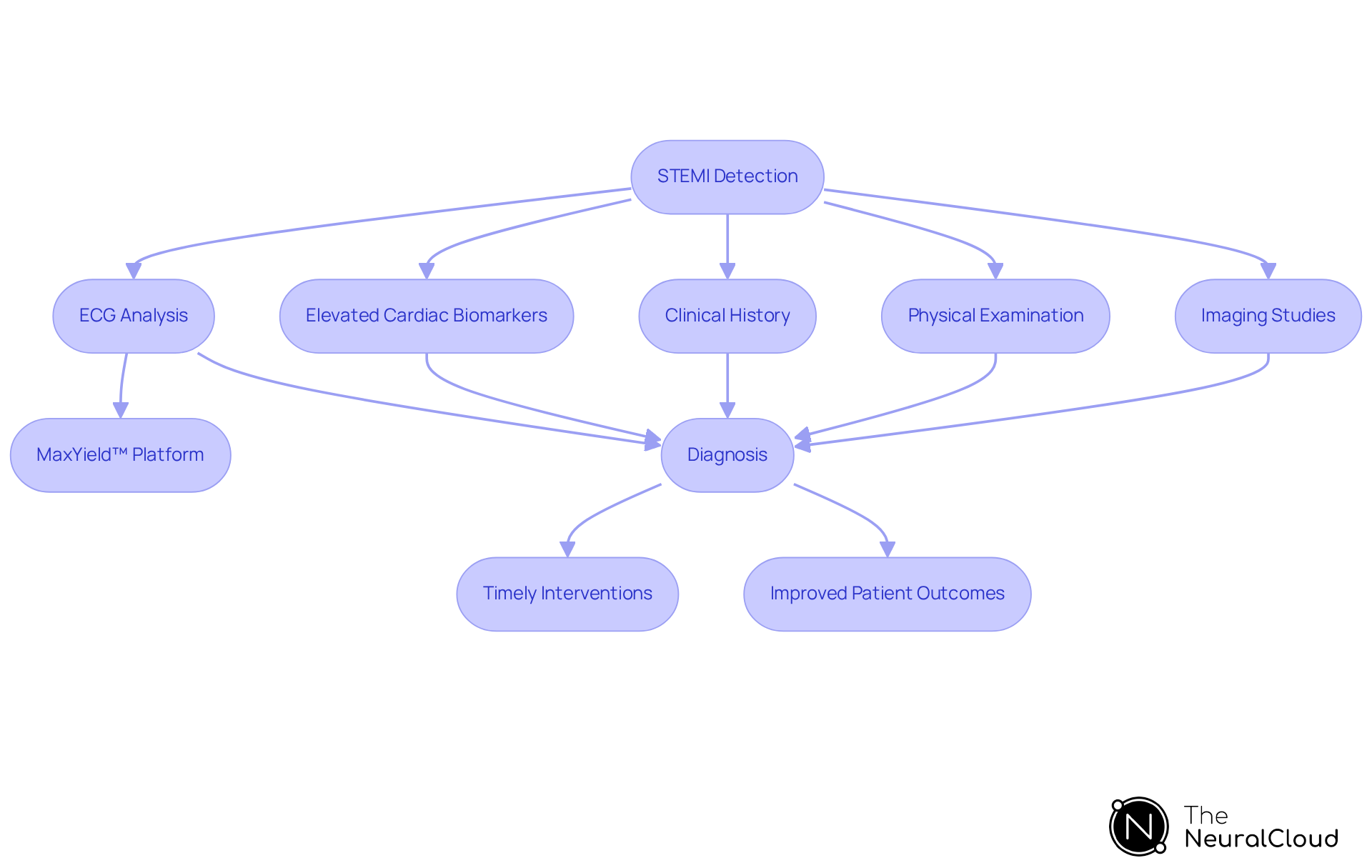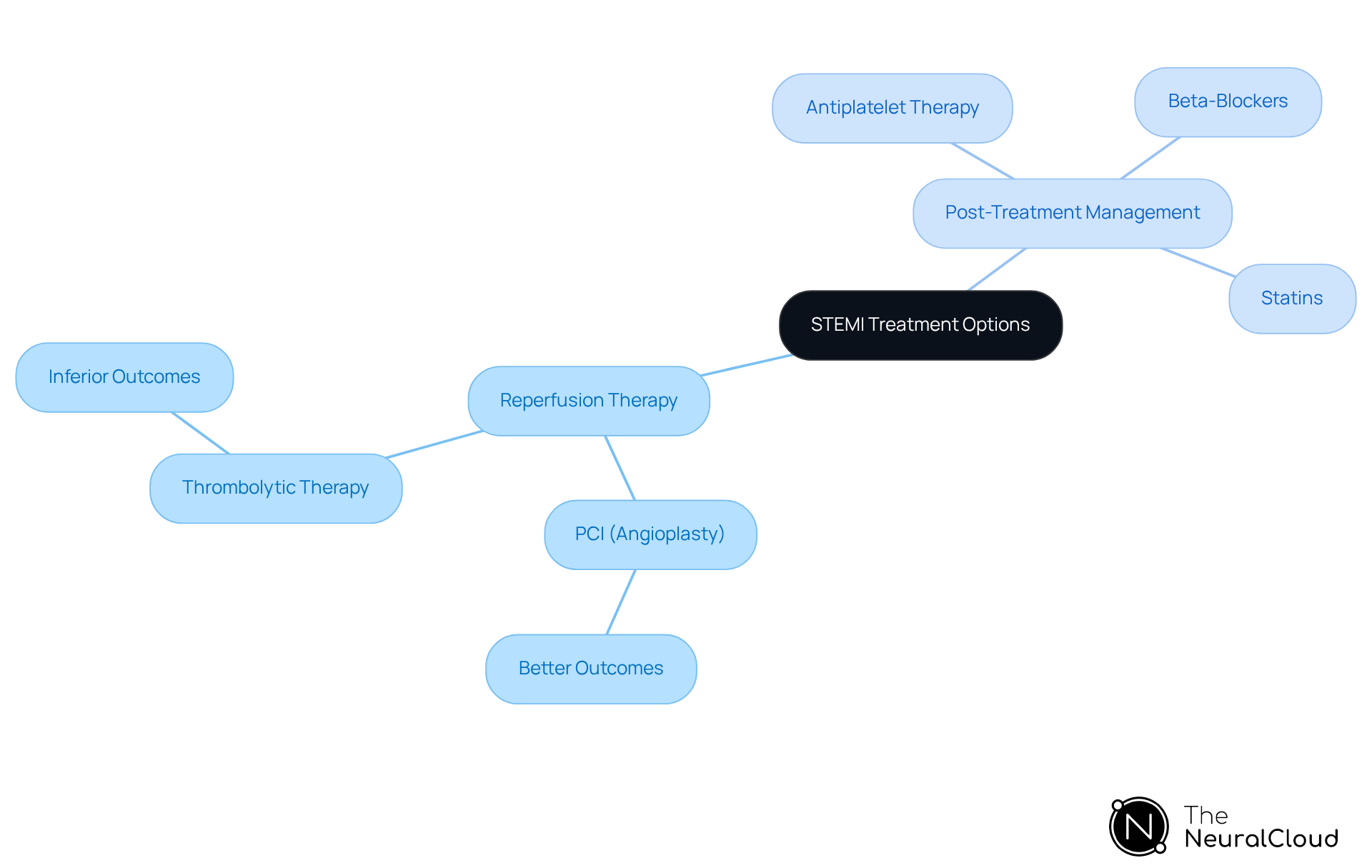Overview
The medical abbreviation STEMI refers to ST-Elevation Myocardial Infarction, a serious condition that signifies a complete blockage of blood flow to the heart. This situation requires immediate medical intervention to avert severe cardiac damage. Timely treatment is crucial, underscored by advanced ECG analysis technologies such as Neural Cloud Solutions' MaxYield™ platform. This platform significantly enhances diagnostic precision and enables rapid responses, ultimately leading to improved patient outcomes in acute cardiac care.
ECG analysis presents various challenges, including the need for accurate interpretation and quick decision-making in critical situations. The MaxYield™ platform addresses these challenges by offering features that streamline the diagnostic process. It utilizes advanced algorithms to analyze ECG data effectively, ensuring that healthcare professionals can make informed decisions swiftly.
The advantages of the MaxYield™ platform extend beyond mere analysis. By improving the accuracy of ECG interpretations, it empowers healthcare providers to respond more effectively to STEMI cases. This capability not only enhances patient care but also supports better resource allocation within healthcare settings, ultimately benefiting both patients and medical staff.
In summary, the MaxYield™ platform stands out as a vital tool in the realm of acute cardiac care. Its innovative features facilitate precise ECG analysis, leading to timely interventions that can save lives. As the medical community continues to seek advancements in technology, solutions like MaxYield™ are essential for enhancing patient outcomes and improving overall healthcare quality.
Introduction
Understanding the nuances of ST-Elevation Myocardial Infarction (STEMI) is essential, as it signifies a life-threatening cardiac event requiring immediate medical intervention. With approximately 285,000 cases reported annually in the U.S., the urgency for timely treatment is paramount to prevent irreversible heart damage.
Despite advancements in diagnostic technologies, a significant challenge persists: how can healthcare professionals ensure rapid recognition and effective treatment of STEMI to enhance patient outcomes?
This article explores the definition, clinical significance, and the latest diagnostic and treatment strategies related to this critical condition.
Define STEMI: Understanding the Medical Abbreviation
The stemi medical abbreviation stands for ST-Elevation Myocardial Infarction, which signifies a critical cardiac event characterized by a significant rise in the ST segment of the electrocardiogram (ECG). This elevation serves as a crucial indicator that a coronary artery is entirely blocked, resulting in a stoppage of blood flow to a portion of the cardiac tissue. Identifying and addressing a myocardial infarction is of utmost importance; failing to act promptly can lead to considerable cardiac damage or even death. Recent studies indicate that approximately 285,000 individuals in the U.S. experience this type of heart attack each year, underscoring its prevalence among cardiac events. Timely intervention is essential, as the objective is to to mitigate long-term damage. Understanding the implications of this condition is vital for healthcare professionals, as it directly informs clinical decision-making and significantly impacts patient outcomes. Symptoms of a heart attack may include tightness, squeezing, or pressure in the chest, which are critical for early recognition. Moreover, studies reveal that myocardial infarctions are more likely to occur on Mondays, emphasizing the need for increased awareness and readiness among healthcare professionals.
Advanced ECG analysis, particularly through Neural Cloud Solutions' MaxYield™ platform, addresses the challenges of diagnosing conditions indicated by the stemi medical abbreviation by employing sophisticated noise filtering and wave recognition techniques. MaxYield™ automates the labeling of critical ECG data, enabling healthcare providers to swiftly isolate and analyze key aspects of the heart's electrical activity, even in recordings with significant noise and artifacts. This capability not only enhances the quality of care but also improves the overall outlook for individuals experiencing this severe cardiac event. The platform's advanced features provide healthcare professionals with the tools needed to make informed decisions quickly, ultimately benefiting patient outcomes.

Explore the Clinical Significance of STEMI in Cardiology
The condition known as myocardial infarction is often referred to by the stemi medical abbreviation, representing a critical issue in cardiology due to its potential for a rapid decline in cardiac function. The clinical significance of this condition is underscored by the urgency it demands; patients experiencing a myocardial infarction, which is indicated by the stemi medical abbreviation, require immediate medical intervention to restore blood circulation and minimize cardiac damage. The American Heart Association highlights the phrase "time is muscle," indicating that the longer the heart is deprived of oxygen, the higher the risk of irreversible damage.
In this urgent context, advanced ECG analysis solutions, such as Neural Cloud Solutions' MaxYield™ platform, play an essential role. MaxYield™ utilizes innovative AI technology to rapidly label critical ECG waveforms, even in noisy recordings. This capability ensures that healthcare teams can swiftly access clear and actionable data, enhancing the urgency of heart attack responses.
The advantages of MaxYield™ are significant. By facilitating quicker interventions, this platform contributes to improved survival rates and reduced complications for patients. Understanding the urgency of , indicated by the stemi medical abbreviation, along with the effectiveness of MaxYield™, can greatly influence patient outcomes in critical care environments. The integration of such advanced technology represents a crucial step toward optimizing care in the face of life-threatening cardiac events.

Identify Diagnostic Criteria and Methods for STEMI Detection
The identification of ST-elevation myocardial infarction relies on the accurate analysis of the ECG, where elevation of the ST segment in particular leads acts as a crucial sign of myocardial damage. In conjunction with this, elevated cardiac biomarkers, particularly troponin levels, are essential for confirming myocardial necrosis. Healthcare professionals typically employ a multifaceted approach that includes clinical history, physical examination, and imaging studies, such as echocardiograms, to evaluate the extent of heart damage.
Recent advancements in ECG analysis technologies present significant challenges and opportunities. The MaxYield™ platform, provided by Neural Cloud Solutions, enhances the precision and speed of heart attack detection. It can process over 200,000 heartbeats in under five minutes, delivering beat-by-beat analysis that isolates critical features like P-waves and QRS complexes. Moreover, its advanced noise reduction and artifact handling capabilities ensure that the analysis is not only rapid but also reliable.
The benefits of the MaxYield™ platform for healthcare professionals are substantial. By improving diagnostic precision, it facilitates timely interventions crucial for patient outcomes. The incorporation of these advanced technologies into clinical workflows highlights the significance of precise ECG interpretation in diagnosing myocardial infarction. Ultimately, this results in , showcasing how innovative solutions can transform patient care.

Review Treatment Options and Management Strategies for STEMI
Reperfusion therapy is the cornerstone of treatment for the stemi medical abbreviation, which is aimed at restoring blood flow to the affected regions of the heart. This can be achieved through percutaneous coronary intervention (PCI), commonly known as angioplasty, or through thrombolytic therapy, which uses medications to dissolve blood clots. Recent statistics indicate that PCI generally yields better outcomes compared to thrombolytic therapy, particularly in reducing mortality and improving heart function. Following reperfusion, individuals typically require additional management strategies, including:
- Antiplatelet therapy
- Beta-blockers
- Statins
to mitigate the risk of subsequent cardiac events. Continuous monitoring and follow-up care are essential for ensuring optimal recovery and rehabilitation.
The integration of advanced technologies, such as Neural Cloud Solutions' MaxYield™ platform, enhances healthcare providers' ability to monitor individual progress and tailor treatment plans based on real-time data. MaxYield™ features gold standard noise filtering and wave recognition capabilities, which improve ECG data processing efficiency. Additionally, it automates repetitive tasks through the data wall, streamlining clinical decision-making and enhancing patient outcomes.
As noted by cardiology specialists, "Effective reperfusion therapy significantly impacts recovery," underscoring the need for timely intervention and comprehensive post-treatment strategies. For instance, a recent case study demonstrated that patients receiving timely PCI had a 30% higher chance of full recovery compared to those treated with thrombolytics alone. This highlights the critical role of both effective reperfusion therapy and the stemi medical abbreviation in to improve patient care.

Conclusion
Understanding the significance of the STEMI medical abbreviation—ST-Elevation Myocardial Infarction—is essential for healthcare professionals and patients alike. This critical cardiac event, marked by a significant elevation in the ST segment of an ECG, indicates a complete blockage of a coronary artery, necessitating immediate medical intervention to restore blood flow and prevent severe damage to the heart. The urgency surrounding STEMI highlights the need for rapid recognition and treatment, as timely action can significantly influence patient outcomes.
Key insights discussed include the importance of advanced diagnostic tools like Neural Cloud Solutions' MaxYield™ platform. This platform enhances ECG analysis by providing features that facilitate quicker and more accurate detection of myocardial infarction. By utilizing innovative technology, healthcare providers can better evaluate heart conditions, leading to improved management strategies and treatment options, such as reperfusion therapy and ongoing patient care. The integration of these advanced techniques is crucial in addressing the challenges posed by STEMI and optimizing clinical outcomes.
In light of the critical nature of STEMI, it is imperative for healthcare professionals to remain vigilant and well-informed about the latest advancements in detection and treatment. Increased awareness and readiness can make a significant difference in the lives of those affected by this condition. By prioritizing education, timely intervention, and the adoption of cutting-edge technologies, the healthcare community can continue to improve the prognosis for individuals experiencing ST-Elevation Myocardial Infarction.
Frequently Asked Questions
What does the abbreviation STEMI stand for?
STEMI stands for ST-Elevation Myocardial Infarction, which indicates a critical cardiac event characterized by a significant rise in the ST segment of the electrocardiogram (ECG).
What does a STEMI indicate about the heart?
A STEMI indicates that a coronary artery is entirely blocked, resulting in a stoppage of blood flow to a portion of the cardiac tissue.
Why is it important to identify and address a myocardial infarction promptly?
Prompt identification and intervention are crucial because failing to act quickly can lead to considerable cardiac damage or even death.
How prevalent are STEMI events in the U.S.?
Approximately 285,000 individuals in the U.S. experience a STEMI each year, highlighting its prevalence among cardiac events.
What is the goal of timely intervention in the case of a STEMI?
The goal is to restore blood flow within 90 minutes to mitigate long-term damage to the heart.
What are common symptoms of a heart attack?
Common symptoms of a heart attack include tightness, squeezing, or pressure in the chest.
When are myocardial infarctions more likely to occur?
Studies indicate that myocardial infarctions are more likely to occur on Mondays.
How does Neural Cloud Solutions' MaxYield™ platform assist in diagnosing STEMI?
The MaxYield™ platform employs sophisticated noise filtering and wave recognition techniques to automate the labeling of critical ECG data, allowing healthcare providers to quickly isolate and analyze key aspects of the heart's electrical activity.
What benefits does the MaxYield™ platform provide to healthcare professionals?
The platform enhances the quality of care and improves patient outcomes by providing healthcare professionals with the tools needed to make informed decisions quickly, even in recordings with significant noise and artifacts.






